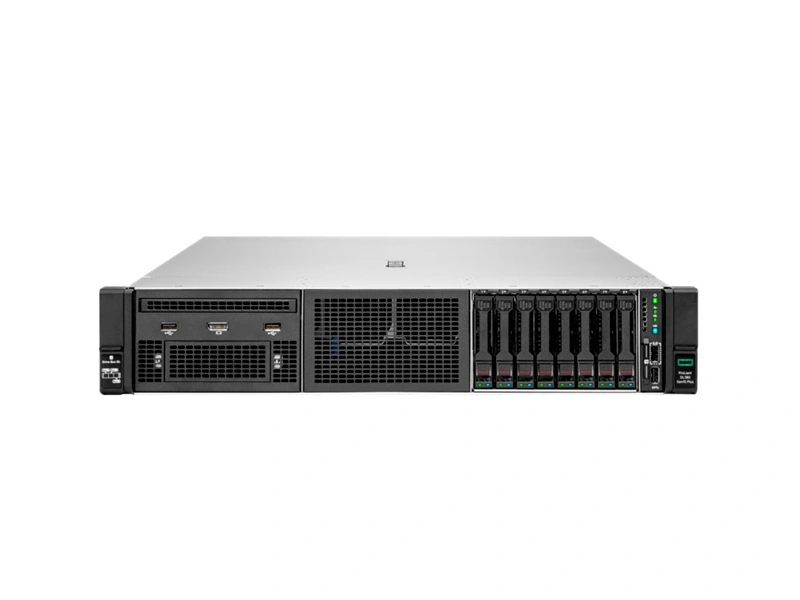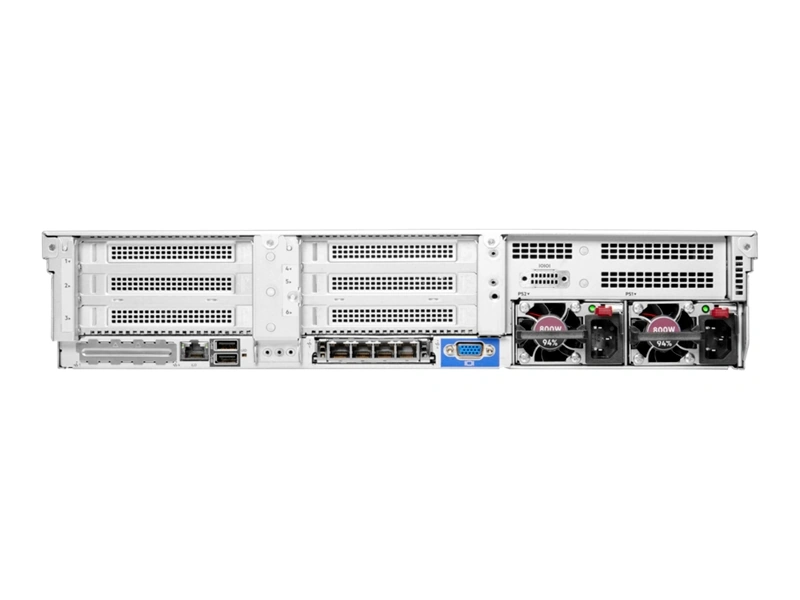What Are the Top 5 Server Specifications That Define Performance?
Why Processor Type and Core Count Matter in Server Specification
Processor type and core count are key to server performance. The CPU handles all processing tasks. Its design affects how well it manages workloads. For example, the FusionServer 2288H V7 supports 1 or 2 x 4th or 5th Gen Intel® Xeon® Scalable Processors with TDP up to 385 W per processor. This setup delivers strong computing power for business needs. More cores allow better multitasking. They also support parallel processing. These are vital for virtualization and cloud systems.
How RAM Capacity and Speed Impact Server Efficiency
Memory is crucial for server speed and handling multiple tasks. Larger RAM capacity lets more programs run at once without slowing down. The FusionServer 2288H V7 supports 32 x 5600 MT/s DDR5 DIMMs. This provides fast memory access for data-heavy tasks.
The Importance of Storage Type and Configuration in Server Performance
Storage setup affects both speed and dependability. SSDs are faster than HDDs for reading and writing data. They are great for databases and real-time analytics. The FusionServer 2288H V7 supports options like 4/8/16/24 x NVMe SSDs or 36 x E1.S SSDs. These deliver excellent data transfer speeds.
RAID setups, such as RAID 5 or RAID 10, protect data by spreading it across drives. At Huaying Hengtong, we guide clients to pick the best storage—SAS, SATA, SSD, or NVMe—and set up RAID based on workload needs.
How Network Interface Specifications Affect Data Throughput
Network interface cards (NICs) control how fast servers share data. Options range from 1GbE to 100GbE connections. The right NIC ensures smooth data flow. Our servers work with high-speed switches like Huawei CloudEngine S6750-H Series. These support hardware-based low-latency QoS queues for multicast packets. This keeps delays low even with heavy traffic.
Huaying Hengtong offers solutions tailored to your bandwidth needs. This is key for running virtual machines or large databases.
The Role of Power Supply and Redundancy in System Stability
Power supply setup is essential for keeping servers running. Redundant power supplies keep systems online if one unit fails. For example, the HPE ProLiant DL360 Gen11 offers an optional up to 2200W 1+1 hot-swappable redundant power supply. It achieves up to 96% titanium efficiency.
How Does CPU Specification Influence Overall Server Capability?
Comparing Intel Xeon and AMD EPYC for Enterprise Use
Choosing between Intel Xeon and AMD EPYC depends on your tasks. Intel Xeon CPUs offer strong performance for single-threaded programs. These suit older applications. AMD EPYC CPUs provide more cores at lower costs. They are great for virtualization.
Huaying Hengtong supplies both CPU types from brands like Dell, HPE, Lenovo, Huawei, and more. We help clients pick CPUs that match their application needs.

Core Count vs. Clock Speed: What Should You Prioritize?
Core count helps with multitasking. It suits cloud hosting or platforms like Kubernetes. Higher clock speeds are better for tasks needing fast single-thread processing.
We review client workloads during consultations. This helps us suggest whether more cores or faster clock speeds will give better value.
Understanding Thermal Design Power (TDP) in CPU Selection
TDP shows how much heat a CPU produces at full load. This affects cooling system choices. The FusionServer 2288H V7 supports CPUs with TDP up to 385W per processor. This shows it can handle powerful CPUs without overheating.
Why Is Memory Specification Critical for Server Workloads?
ECC vs. Non-ECC RAM: What’s Suitable for Your Server?
ECC RAM catches and fixes data errors. This is vital for businesses where stability matters most. Non-ECC RAM costs less but risks crashes from undetected errors.
Memory Channels and Scalability Options Explained
More memory channels increase data flow between the CPU and RAM. Servers like the FusionServer 2288H V7 support up to 48 x DIMMs. This allows growth as business needs expand.
We help clients plan memory setups that support future growth without replacing entire systems.
How Memory Bandwidth Affects Multitasking and Virtualization
Memory bandwidth controls how fast data moves between RAM and CPU. This is key in virtualized setups with multiple operating systems running at once.
What Should You Know About Storage When Evaluating a Server?
SSD vs. HDD: Which Is Better for Enterprise Applications?
SSDs offer quick access times but cost more per GB. HDDs provide larger storage at lower prices but are slower. Many businesses use both for a balanced approach.
Huaying Hengtong offers storage options from SATA HDDs to NVMe arrays. We match these to your performance and budget goals.
Understanding RAID Configurations in Modern Servers
RAID spreads data across drives for protection. Options like RAID 10 mix mirroring and striping for speed and safety. The FusionServer supports RAID 0, 1, 10, 5, 6, and more. This gives flexibility based on risk levels.
The Significance of NVMe Drives in High-Performance Environments
NVMe drives use PCIe lanes for much faster speeds than SATA SSDs. They are ideal for AI training or real-time analytics. The FusionServer supports up to 34 x full NVMe SSDs. This delivers top-notch data transfer rates.

How Do Network Capabilities Enhance Server Functionality?
Evaluating Ethernet Speeds: 1GbE, 10GbE, or Higher?
Modern tasks need fast network connections. Small businesses may use 1GbE ports. Larger firms benefit from 10GbE or higher. Huawei CloudEngine S6750-H Series supports up to 100GE interfaces. This ensures future-ready setups.
Dual-Port vs. Quad-Port NICs: Which One Fits Your Needs?
Dual-port NICs offer basic backup. Quad-port NICs add failover and load balancing. These are key for clustered setups.
The Impact of Network Interface Cards on Virtualization
Advanced NIC features, like SR-IOV, reduce hypervisor workload. This boosts virtual machine performance. Our team ensures NICs work with your virtualization tools, like VMware ESXi or Microsoft Hyper-V.
Why Is Power Supply Specification a Key Factor in Reliability?
Single vs. Redundant Power Supplies: What’s the Risk?
Single PSUs risk shutdown if they fail. Redundant PSUs provide backup instantly. Servers like the DL385 Gen10 Plus support a 1600W 1+1 hot-swappable redundant power supply.
Efficiency Ratings (80 PLUS): How They Affect Energy Use
Higher efficiency ratings, like 96% titanium, cut energy waste. This lowers costs over time. The DL360 Gen11 supports up to 96% titanium efficiency. This suits firms aiming for green IT.
Hot-Swappable Features for Continuous Operation
Hot-swappable parts allow repairs without shutting down. This is vital for places like trading floors or healthcare systems. The DL385 Gen10 Plus supports hot-swappable redundant fans.
Who Is Huaying Hengtong and What Do We Offer?
Our Commitment to Reliable Server Hardware Solutions
Huaying Hengtong started in 2016 with 30 million yuan in capital. We focus on sales and service of top server brands like Dell, Lenovo, Huawei, and Inspur. After over ten years, we are a leading IT provider in China. We offer scalable solutions for many industries.
Comprehensive Product Line Tailored to Enterprise Needs
Our product line is broad, covering hundreds of servers. These include rack-mounted units like the DL360 Gen11 and scalable FusionServer models. All include security features like TPM/TCM modules in ProLiant models.
Dedicated Support Services from Consultation to Deployment
We follow a customer-first approach. Our services cover demand analysis, technical checks, equipment selection, network setup, quality assurance, and maintenance. Our goal is not just to sell hardware. We aim to build lasting partnerships for IT success.
FAQ
Q: Which brand offers the best server specification options?
A: Brands like Dell EMC PowerEdge or Huawei FusionServer offer great setups. Huaying Hengtong provides access to these based on client needs.
Q: How do I choose between Intel Xeon vs AMD EPYC processors?
A: Pick Intel Xeon for strong single-thread performance. Choose AMD EPYC for more cores, ideal for virtual machines.
Q: What is the best storage option—SSD vs HDD—for enterprise servers?
A: SSDs suit speed-critical tasks. HDDs offer more storage for less cost. Huaying Hengtong provides hybrid solutions with RAID.
Q: Are redundant power supplies necessary?
A: Yes, for critical systems. Redundant PSUs prevent outages, ensuring business continuity.
Q: What are the top server specifications I should check before buying?
A: Check processor type/core count, memory capacity/speed (preferably ECC), storage setup (especially NVMe), network capabilities (like dual-port NIC), and redundant power supply ratings (80 PLUS Titanium preferred).











